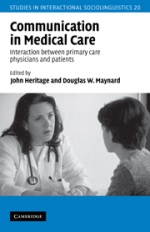Communication tips by Nursing on the Move.
 Are you a professional or a pre-professional?
Are you a professional or a pre-professional?
Do you use a second or foreign language at work?
Do you have a friend who speaks a foreign language at work or has a cultural background different from colleagues/customers?
Improve your directive skills by trying the following tips.
The communication may require some directive skills. Directive skills are powerful tools in medical interaction. They include asking questions, asking for clarifications, providing a rationale and signposting.
Asking good questions facilitates the consultation, saves you time and results in better health care for the patient. Asking good questions also makes the patient feel comfortable and shows that you are attentive and conscious about their concerns.
The content of a good question meets two criteria, i.e. it
– fits in the conversation and relates directly to the patient’s story. A good question should not be unexpected or unrelated to what has come before.
– follows a particular technique called the open-to-closed cone of questioning.
A good general strategy for gathering info rmation from patients is to start with open-ended questions and move towards more focused and closed-ended questions.
rmation from patients is to start with open-ended questions and move towards more focused and closed-ended questions.
You can find an overview of all communication tips by Communication for Professionals here.
Communication in Medical Care – Interaction between Primary Care Physicians and Patients
John Heritage, University of California, Los Angeles, Douglas W. Maynard, University of Wisconsin, Madison
„Using conversation analysis techniques, the authors analyze the sequential unfolding of a visit, and describe the dilemmas and conflicts faced by physicians and patients as they work through each of these activities. The result is a view of the medical encounter that takes the perspective of both physicians and patients in a way that is both rigorous and humane. Clear and comprehensive, this book will be essential reading for students and researchers in sociolinguistics, communication studies, sociology, and medicine.“
Physician Attire in the Intensive Care Unit and Patient Family Perceptions of Physician Professional Characteristics
by Selena Au, MD; Farah Khandwala, MSc; Henry T. Stelfox, MD, PhD
„Physician attire is a modifiable factor that has been demonstrated to influence the patient-physician relationship. However, patient-physician interactions in the intensive care unit (ICU) differ from other health care settings. Patients admitted to the ICU typically do not have a preexisting long-term relationship with their ICU physician, and therefore trust needs to be established over a short time frame.The severity of patient illness frequently results in the active participation of family as surrogate decision makers, complicating the patient-physician relationship.“ Read this article.
Tip: More up to date educational events dealing with “Communication fpr professionals” can be found online on the Education Database »medicine & health«.

